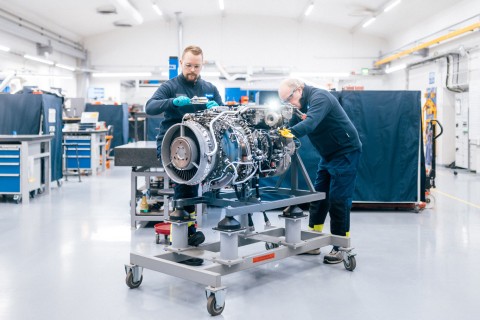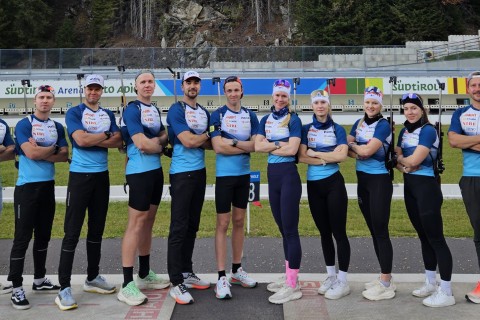
Sustainability
Supplier Code of Conduct
Patria's Supplier Code of Conduct
I. Introduction
Patria Group’s (“Patria”) reputation and long-term reliability as a partner are the basis for profitable business and form a significant part of the Group´s value. Patria´s entire business is built on trust, which means honesty, reliability and high standards of ethical business conduct.
Patria is committed to these values and expects its suppliers to know and follow those, as represented in this Code.
II. Content, Scope and Applicability
The Code specifies the minimum standards of behaviour Patria requires of its suppliers, based on the principles of Patria’s Ethical Code of Conduct.
Suppliers are required to adhere to and comply with the principles set out in this document. In the event that local law, regulation or rules impose stricter requirements than this Code, suppliers must comply with those requirements.
The Code is applicable to all suppliers and partners who supply products or services related to Patria contracts or purchase orders.
Patria is committed to supporting suppliers’ reporting of unethical actions. Any compliance concerns or potential or suspected violations of the Code are encouraged to be reported using Patria’s SpeakUp channel which is available on Patria’s external website in all the operation countries' languages. Patria’s SpeakUp channel enables anonymous reporting and dialogue.
III. Compliance with Laws and Agreements
The Supplier shall comply with all applicable laws and regulations of the countries in which operations are managed or services provided. The Supplier shall in all its operations comply with its agreements with Patria (including but not limited to any Patria subsidiary, affiliate or joint venture) as well as its agreements with any of its business partners and suppliers.
IV. Human Rights
The Supplier shall treat its own employees and other people with respect and dignity, encourage diversity, remain receptive to diverse opinions, promote equal opportunities for all, and foster an inclusive and ethical culture, in accordance with the relevant International Labor Organization (ILO) Conventions. The Supplier must develop, implement and maintain effective methods and processes to ensure labor laws and the prohibition of child labor and human trafficking are complied with by any sub-tier suppliers. Personal information must be adequately processed.
A. Child Labor
The Supplier must ensure that child labor is not used in the performance of work. The term "child” refers to any person under the minimum legal age for employment where the work is performed provided the legal age is consistent with the minimum working ages defined by the International Labour Organization (ILO).
B. Human Trafficking, including Forced Labour
The Supplier must adhere to regulations prohibiting human trafficking and comply with all applicable local laws in the country or countries in which it operates. The Supplier must refrain from violating the rights of others and address any adverse human rights impacts of its operations.
C. Information Protection
The Supplier shall properly handle sensitive information, including confidential, proprietary, and personal information. Information should not be used for any purpose (e.g. advertisement, publicity, and the like) other than the business purpose for which it was provided, unless there is prior authorization from the owner of the information.
D. Information Security and Privacy
The Supplier shall protect the confidential and proprietary information of others, including personal information, from unauthorized access, destruction, use, modification and disclosure, through appropriate physical and electronic security procedures. The Supplier must comply with applicable data privacy laws.
V. Employment Practices
A. Harassment
The Supplier is expected to ensure that its employees are afforded an employment environment that is free from physical, psychological, and verbal harassment, or other abusive conduct.
B. Non-discrimination
The Supplier is expected to provide equal opportunities to employees and applicants for employment without discrimination.
E. Wage and Benefits
The Supplier must pay employees and contractual workers at least the minimum compensation required by local law and provide all legally mandated benefits. In addition to payment for regular hours of work, workers must be paid for overtime at such premium rate as is legally required or, in those countries where such laws do not exist, at least equal to their regular hourly payment rate.
F. Freedom of opinion and assembly
The Supplier is expected to respect the rights of workers to associate freely and communicate openly with management regarding working conditions without fear of harassment, intimidation, penalty or interference. The Supplier is also expected to recognize and respect any rights of workers to exercise lawful rights of free association, including joining or not joining any association of their choosing.
VI. Anti-Corruption
A. Anti- Corruption Laws
The Supplier must comply with the anti-corruption laws, directives and regulations that govern operations in the countries in which it conducts business.
The Supplier is required to refrain from offering or making any improper payments or offering anything of value to government officials, political parties, candidates for public office, or other persons. This includes a prohibition of facilitating payments intended to expedite or secure performance of a routine governmental action like obtaining a visa or customs clearance, even in locations where such activity may not violate local law. Personal safety payments are permitted where there is an imminent threat to health or safety. Suppliers must only engage with employees, agents, intermediaries, consultants, representatives, distributors, teaming partners, contractors, suppliers, consortia and joint venture partners who meet Patria’s and supplier’s standards with regard to reputation and conduct.
B. Illegal Payments
The Supplier shall not offer any illegal payments to, or receive any illegal payments from, any customer, supplier, their agents, representatives or other parties. The receipt, payment, and/or promise of sums of money or anything of value, directly or indirectly, intended to attempt to exert undue influence or attempted to gain any improper advantage is prohibited. This prohibition applies even in locations where such activity may not violate local law.
Arrangements without clearly determined roles and deliverables are against Patria’s principles and are not acceptable. Neither are situations, where a partner would receive payments or other benefits, without providing the Supplier or Patria any actual business services.
C. Fraud and Deception
The Supplier shall not seek to gain any advantage of any kind by acting fraudulently, deceiving people or making false claims, or allow anyone else to do so. This includes defrauding or stealing from the company, a customer or any third party, and any kind of misappropriation of property.
D. Gifts / Business Courtesies
The Supplier is expected to compete on the merits of its products and services. The exchange of business courtesies may not be used to gain an unfair competitive advantage. In any business relationship, The Supplier must ensure that the offering or receipt of any gift or business courtesy is permitted by law and regulation, and that these exchanges do not violate the rules and standards of the recipient’s organization and are consistent with reasonable marketplace customs and practices.
E. Conflict of Interest
The Supplier is expected to avoid all conflicts of interest or situations giving the appearance of a potential conflict of interest. The Supplier is expected to provide notification to all affected parties in the event of an actual or potential conflict of interest.
VII. Global Trade Compliance and Sanctions
A. Export controls and sanctions due diligence
Suppliers must comply with all relevant export control legislations when exporting goods or technology, and shall plan for and obtain all necessary authorisations and permits to ensure timely and compliant delivery of their products. Where an authorisation or permit so requires, suppliers shall also have in place all the necessary processes to manage access to export controlled goods or technology only by staff or other entities authorised to have such access. Where applicable, this requirement shall be flowed down to any sub-tier suppliers.
Suppliers must have a risk management process in place and appropriate due diligence measures to identify customers and business partners and conduct regular checks to ensure that they are not designated, blocked or otherwise targeted by applicable economic or trade sanctions in order to avoid doing business with sanctioned parties. The Supplier shall provide truthful and accurate information and obtain export licenses and/or consents where necessary.
B. Responsible Sourcing of Minerals
The Supplier must comply with applicable laws and regulations regarding Conflict Minerals which include tin, tungsten, tantalum and gold. The Supplier should exercise, as may be directed by law, due diligence on the source and chain of custody of these minerals and therefore at a minimum require the same from their next tier The Supplier.
VIII. Competition and Anti-Trust
The Supplier shall not fix prices or engage in any bid rigging or competition limiting cooperation with its competitors. It shall not exchange current, recent, or future pricing information with competitors and it shall refrain from participating in a cartel. The competitor shall comply with all applicable competition legislation.
IX. Intellectual Property
The Supplier shall comply with all the applicable laws governing intellectual property rights assertions, including protection against disclosure, patents, copyrights, and trademarks.
X. Environment
The Supplier shall comply with all environmental and chemical laws and regulations applicable to their business in countries in which operations are managed, or services provided. The Supplier shall operate responsibly with chemicals and minimize harmful or hazardous impacts to employees and environment.
The Supplier is expected to operate in a manner that actively manages environmental risks across their operations, conserves natural resources and protects the environment in the communities within which it operates.
Suppliers are expected to:
- establish an appropriate environmental management system, including environmental policy and procedures to manage their environmental performance. Environmental considerations are to be carried out including all operations, products and services.
- follow the carbon footprint of their operations and actively seek opportunities to reduce carbon footprint throughout the whole lifecycle of their products and services.
- follow energy consumption of their operations, favor sustainable energy sources, improve the efficiency of usage of energy and provide energy saving plans and actions.
- to develop their supply chain and transportation solutions in order to minimize carbon footprint and other environmental impacts.
- to minimize waste volumes, maximize recycling rate of waste and to organize the collection, storing and transportation of waste in responsible way.
- minimize the usage of freshwater and handle wastewater in an appropriate and compliant way to minimize any harmful impacts to the environment.
- improve the environmental awareness of their staff and stakeholders and encourage them to act in an environmentally sustainable way.
XI. Health and Safety
The Supplier shall comply with all applicable health and workplace safety laws and regulations. The Supplier should protect the health, safety, and the welfare of its employees, contractors, visitors and others who may be affected by its activities.
XII. Counterfeit Parts
The Supplier is expected to develop, implement, and maintain effective methods and processes appropriate to their products to minimize the risk of introducing counterfeit parts and materials into deliverable products. In addition, The Supplier shall provide notification to recipients of counterfeit product(s) when warranted and exclude them from the delivered product.
XIII. Maintain Accurate Records
The Supplier is expected to create accurate records, and not alter any record entry to conceal or misrepresent the underlying transaction represented by it. All records, regardless of format, made or received as evidence of a business transaction must fully and accurately represent the transaction or event being documented. Records should be retained based on the applicable retention requirements.
XIV. Violation of the expectations stated herein
In the event that the expectations of this code are not met, the business relationship may be reviewed and corrective action may be pursued subject to the terms of the related procurement contracts.
Patria magazine
15.12.2025
Patria AMV XP - Performance evolved
12.12.2025
Patria SHIFTR - Communication wins battles


























